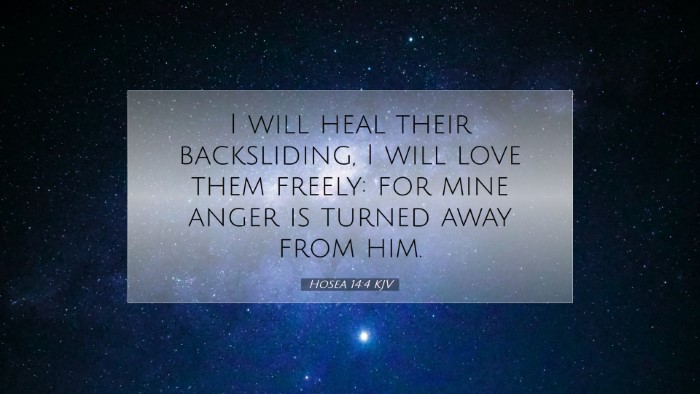Old Testament
Genesis Exodus Leviticus Numbers Deuteronomy Joshua Judges Ruth 1 Samuel 2 Samuel 1 Kings 2 Kings 1 Chronicles 2 Chronicles Ezra Nehemiah Esther Job Psalms Proverbs Ecclesiastes Song of Solomon Isaiah Jeremiah Lamentations Ezekiel Daniel Hosea Joel Amos Obadiah Jonah Micah Nahum Habakkuk Zephaniah Haggai Zechariah MalachiHosea 14:4
Hosea 14:4 KJV
I will heal their backsliding, I will love them freely: for mine anger is turned away from him.
Hosea 14:4 Bible Commentary
Bible Commentary on Hosea 14:4
Verse Context: Hosea 14:4 states, "I will heal their backsliding, I will love them freely: for mine anger is turned away from him." This verse encapsulates one of the central themes of the prophetic literature of the Old Testament, focusing on God's love, forgiveness, and the promise of restoration.
Introduction
The prophetic books, especially Hosea, often illustrate the relationship between God and His people as that of a marriage, where infidelity and subsequent reconciliation serve as a metaphor for Israel's spiritual state. Hosea speaks into a context of moral decay and disobedience but also offers hope and healing. Scholars and theologians delve deep into this verse, exploring its implications for understanding God's nature, the concept of repentance, and the promise of divine mercy.
Commentary Insights
God's Healing and Restoration
Matthew Henry emphasizes the pastoral nature of this promise, noting that God’s healing signifies a restoration of the relationship marred by sin. He describes how God is both hurt by human sin and eager to heal it, underlining the sovereignty of God's grace in a broken relationship. Henry suggests that God's initiative in healing backsliding demonstrates that it is not solely the responsibility of man to return to God, but that God actively seeks to mend the wounds caused by disobedience.
The Nature of God's Love
Albert Barnes reflects on the phrase "I will love them freely," noting that God's love is unconditional and overflowing. Unlike human love that can be contingent on merit, God's love is given freely, irrespective of Israel's previous sins. He points out that divine love compels genuine repentance, as it is rooted in the grace that offers forgiveness without demanding prior restitution. This view aligns with the wider biblical narrative of grace through faith rather than works.
Anger Turned Away
Adam Clarke comments on the end of God’s anger, underscoring that the turning away of divine displeasure marks a pivotal shift in relational dynamics. Clarke suggests that this change is the result of sincere repentance from Israel, emphasizing that God’s anger, while justified, can be appeased through true contrition. This aspect links back to the prophetic call for Israel to return to God, pointing to the necessity of acknowledging one’s sin to experience restoration.
Theological Implications
- The Concept of Backsliding: Hosea 14:4 terms Israel's state as "backsliding," which presents a significant theological concept. This term implies a moving away from an established relationship with God, highlighting the need for continual faithfulness and vigilance in the spiritual journey.
- Divine Initiative in Salvation: The verse illustrates a powerful truth in theology: God is proactive in humanity's salvation. God's healing in response to backsliding indicates that restoration begins with divine action, prompting a call to human participation in the process of reconciliation.
- The Atonement and Grace: The unconditional nature of God’s love suggests a prelude to the richer theological reflection on atonement in Christ. The ultimate healing of spiritual backsliding can be seen in the New Testament as fulfilled in Jesus, who embodies God’s love turned completely toward humanity, reconciling us through grace.
Practical Application for Today
For pastors, students, and theologians today, Hosea 14:4 serves as a reminder of the need for continual self-examination, acknowledging personal areas of backsliding, whether in practicing faith or spiritual disciplines. The emphasis on God’s unmerited love can motivate congregations to embrace the message of grace, both in personal lives and in outreach initiatives, encouraging others to seek divine healing.
Furthermore, this verse invites reflection on the communal aspect of faith. Just as God offers healing to His people as a collective body, churches can engage in communal repentance, seeking a renewal that aligns with God's vision for restoration.
Conclusion
Hosea 14:4 is a profound declaration of the character of God, emphasizing His desire for healing and love amidst human shortcomings. Through the insights of respected commentators like Matthew Henry, Albert Barnes, and Adam Clarke, we glean the depth of this prophetic message. It continues to resonate today, offering hope and encouragement to all who feel the weight of sin, reminding us that God's love freely provides the way back to fellowship with Him.


